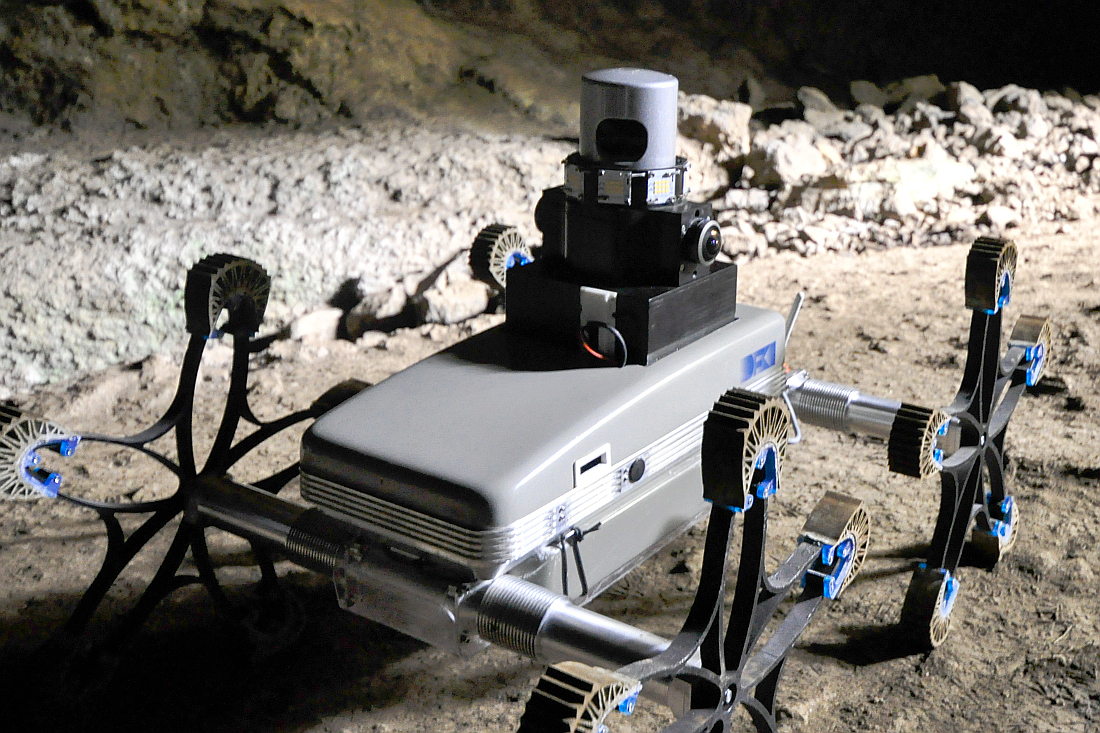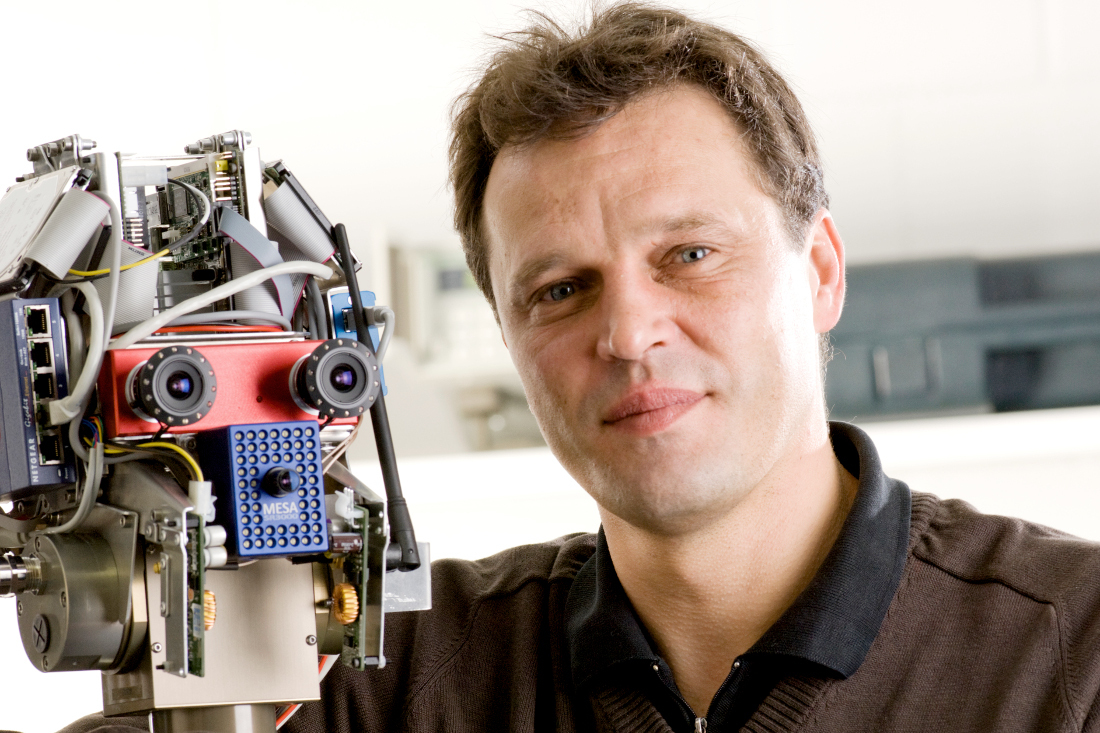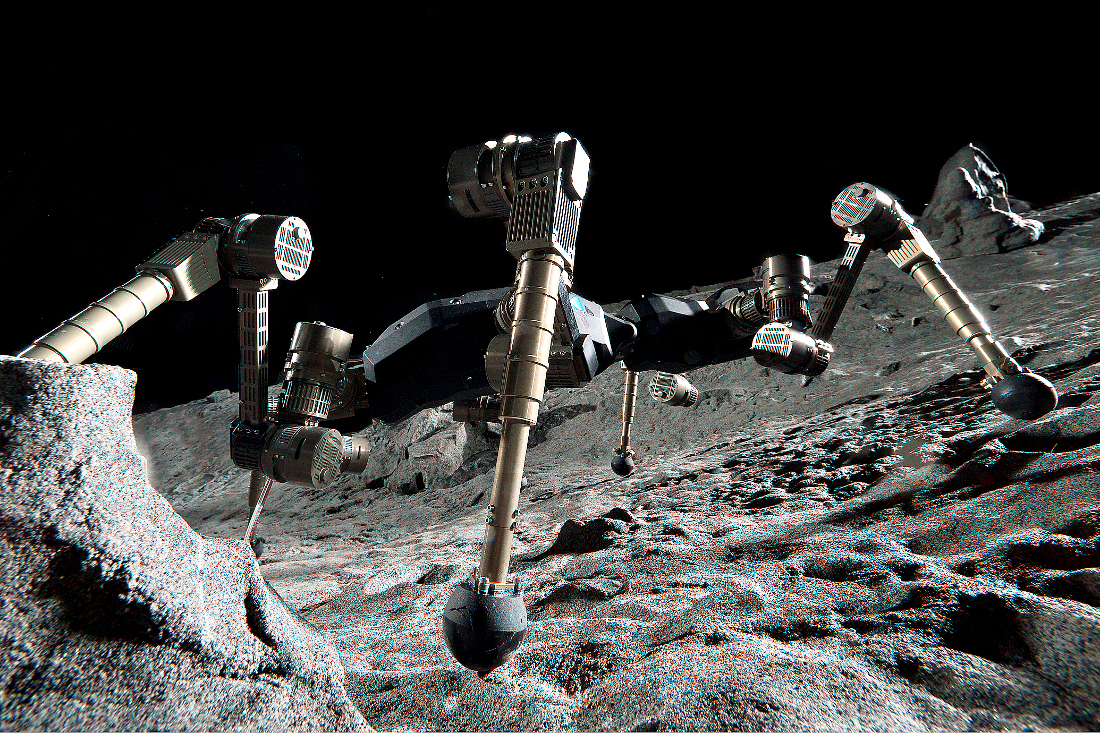Artificial intelligence made in Bremen
AerospaceDFKI celebrates 30 years of success: Bremen facility leads the way in robotics, working on a number of projects including the development of innovative space flight technology

From its humble beginnings in 2006 with a single laboratory and two employees, this organisation has developed into a true success story. Today, over 200 staff are employed in Bremen at the German Research Center for Artificial Intelligence (DFKI), supported by more than 100 student assistants. They develop mobile robotic systems that can independently solve complex problems on land, in water, in the air and in space. The driving force behind this project is Professor Frank Kirchner, who was involved in establishing the Bremen facility and is now opening up new perspectives with his idea for a company.
While studying at the University of Bonn, Kirchner attended a lecture which gave him a lot to think about. The topic? Theoretical computer science. Kirchner was fascinated by the idea that systems exist which cannot be accounted for by mathematics. Alongside this, he studied the scientist Alan Turing, who was researching artificial intelligence at the start of the 20th century and developed a test which can be used to compare the intelligence of a machine with that of a human. “If they are equal, does that mean that humans are also machines, and can therefore be manipulated? This question astounded and scared me at the same time, but it piqued my interest. At the same time, even then I knew that researching artificial intelligence means that we are obliged to keep people continuously informed about the status of our research,” says Kirchner.
At the end of the 1990s, Kirchner moved to the USA and accepted a professorship in robotics at Northeastern University in Boston. “Artificial intelligence was always my focus. It’s not a computer program – it is embedded in a robotic system which is made of aluminium and copper wires and which has contact with the real, unpredictable environment. Finding the solution to this challenge is our core task.”

1988: the DFKI is founded in Saarbrücken and Kaiserslautern
While Kirchner had been studying, completing his doctorate and moving to the USA, computer science in Germany was advancing rapidly. In the 1970s, the first computer science professorships were established at universities. Thanks to the contributions of scientists such as Kurt Gödel and John von Neumann, Germany played a significant role in researching artificial intelligence. For this reason, the German Research Center for Artificial Intelligence (DFKI) was founded as a non-profit public-private partnership. A number of places tried to attract the new organisation, and it was Kaiserslautern and Saarbrücken that ultimately prevailed. And for good reason: in the early 1990s, scientists in a team led by Professor Wolfgang Wahlster, scientific founding director of the DFKI, laid the foundations for Siri, Alexa and co. with “Verbmobil”, their speech recognition and translation system.
In light of all these rapid developments, in 2002 Kirchner was faced with a choice: to stay in Boston or to return to Germany. In the end, Professor Bernd Krieg-Brückner from the Department for Mathematics and Computer Science at the University of Bremen asked Kirchner to accept the first professorship of robotics in Bremen.
There were two key reasons for my decision to go to Bremen: firstly, I could establish a department of robotics at the university. Secondly, the University of Bremen was the only facility at the time which offered a Dual Career Programme and could therefore offer my wife an interesting position as well.
Professor Frank Kirchner, Head of the Robotics Innovation Center at the DFKI
From a two-person laboratory to a DFKI facility
From 2002, Kirchner held the professorship of robotics in the Department of Mathematics and Computer Science. “It was an exciting time – little by little, hardware, sensors and chips were becoming more powerful and opening up more and more possibilities.” Thanks to Krieg-Brückner and his contacts at the DFKI, the idea of establishing a DFKI laboratory in Bremen was born. “Initially, I thought it was crazy, but I was soon convinced. The authorities in Bremen and the regional government’s commissioner for technology were also enthusiastic,” explains Kirchner. With support from the state of Bremen and the Federal Ministry of Education and Research, the DFKI laboratory for robotics and secure cognitive systems opened in February 2006. “At the start, I lost sleep wondering whether we would even manage to pay the rent,” recalls Kirchner. The DFKI rented the laboratory at 5 Robert-Hooke-Strasse, where Kirchner began work with just two employees.

In hindsight, these worries were unfounded – the projects kept coming. “We owe our success in large part to our highly-motivated employees. They simply enjoy their work and have always persevered, even if we failed to win a project every now and then.” After three years of successful development work and exceeding target agreements, the laboratory’s preliminary status was lifted in 2009 and Bremen became the third fully-fledged DFKI facility. “At this point we really have to praise the vision of the federal state of Bremen, as they invested in AI at a time when hardly anyone was even talking about the subject, let alone spending billions worldwide on its development. This is the reason why Bremen is among the global leaders in AI today,” Kirchner elaborates.
But there’s more: space exploration hall under construction
Just a year later, the space exploration hall was constructed as an extension to the DFKI’s main building, measuring 24 metres in length, twelve metres across and ten metres high. Here, space robots can be tested under realistic conditions – such as on the nine metre wide cratered terrain. Additionally, the ceiling of the hall is high enough that flight systems and interactions between satellites and robots can be tested. The costs for building and fitting out the hall – around €600,000 – were shared equally by DFKI shareholder Astrium, Bremeninvest and the DFKI.

In-depth research in a saltwater pool
2014 saw the construction of the 1,300m² maritime exploration hall. New robotic technology is tested for use in and on water in saltwater pools, test pools, a virtual reality laboratory and a pressure chamber. The hall was built at the new headquarters of the DFKI at 1 Robert-Hooke-Strasse. There has also been growing public interest in the DFKI’s research activities. Kirchner has remained true to his promise to keep people continuously informed about the current progress of artificial intelligence research. Among other initiatives, the organisation regularly holds open days. “We had five visitors on our first open day – now, we have over 1,000,” says Kirchner. “We couldn’t be happier. After all, 75 per cent of our funding comes from public funds and 25 per cent comes from industry – so it’s our responsibility to show people what we are doing.”
Plans for a new company
High demand from industry brings huge potential with it. However, as Kirchner explains, “We at the DFKI aren’t allowed to make any profit from the results of our research. But there would be many opportunities to develop marketable products on the basis of our results. The other problem we face is that we are only ever able to offer our employees limited, project-specific contracts and they could earn more by working in industry.” In order to avoid losing long-term employees entirely to industry and to be able to offer them career prospects, Kirchner is planning to found a company. Or rather, his employees will.
Everything should be in place by 2018. The employees will own the company; based on their expertise and the solutions offered by the DFKI’s research, they will develop and market new products. Kirchner has already secured commitments from investors and from the commercial department of the state government. It is clear that this venture has great potential, especially in the Bremen-based aerospace industry, and the project is now moving into the advanced planning stages. However, products will also be developed for other sectors such as underwater technology, Industry 4.0, rehabilitation robotics, machine learning and web-based platforms or tools.
The planned location is 5 Robert-Hooke-Strasse. “For me, this nicely closes a circle, as this is where we at the DFKI first started out,” says Kirchner. To make space, the DFKI employees at number 5 will move to number 1, as a further extension will be built behind this building in the near future, allowing more space for further research into artificial intelligence.
Find out more about Aerospace in Bremen.
Your contact persons for moving to Bremen are Thorsten Tendahl, team leader for national relocations, +49 (0)421 9600 121, thorsten.tendahl@wfb-bremen.de and for international relocations Andreas Gerber, team leader of Bremeninvest, +49 (0)421 9600 123, gerber@bremen-invest.com.
If you want to know more about Bremen Technology Park, please contact Anke Werner, +49 (0)421 9600-331, anke.werner@wfb-bremen.de.
In this article, you will find out why Bremen Technology Park is so successful.
Success Stories
The new Ariane 6 is due to take off for the first time in summer 2024 and will secure Europe's access to space. A central element of this, the upper stage that carries the "rocket´s brain", comes from Bremen. A look behind the hermetically sealed doors in the airport city shows how the upper stage is being built in the Hanseatic city.
Learn moreInto the flowerbed instead of the trash: the products from Bremen-based Scribbling Seeds turn discarded office and advertising materials into tomatoes, basil or sunflowers. Founder Anushree Jain is certain that this is the way to a more sustainable office.
Learn moreBremen is Germany’s sixth-largest industrial hub in terms of revenue. Whether the sector is aerospace, food, automotive, shipping or steel production, Bremen has always been a major player.
Learn more
